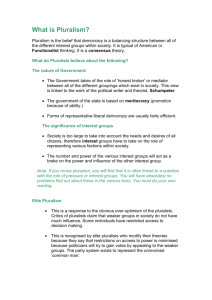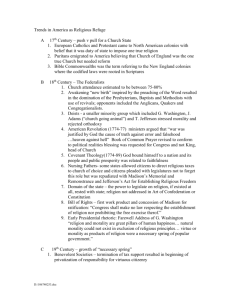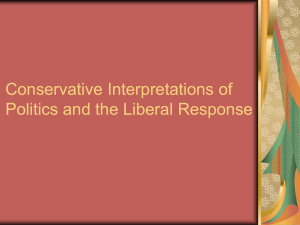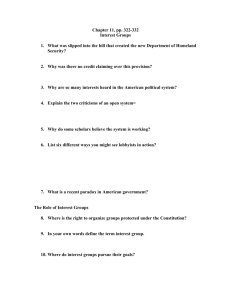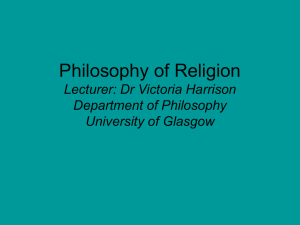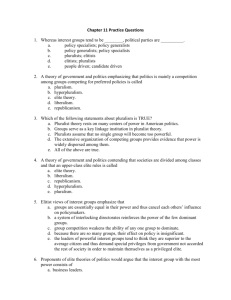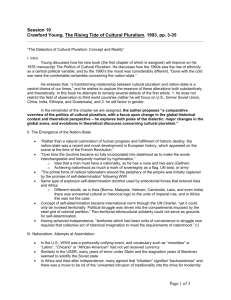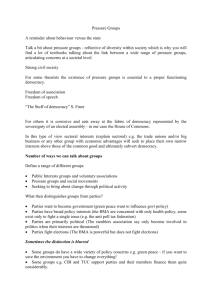Pluralism against liberalism?
advertisement
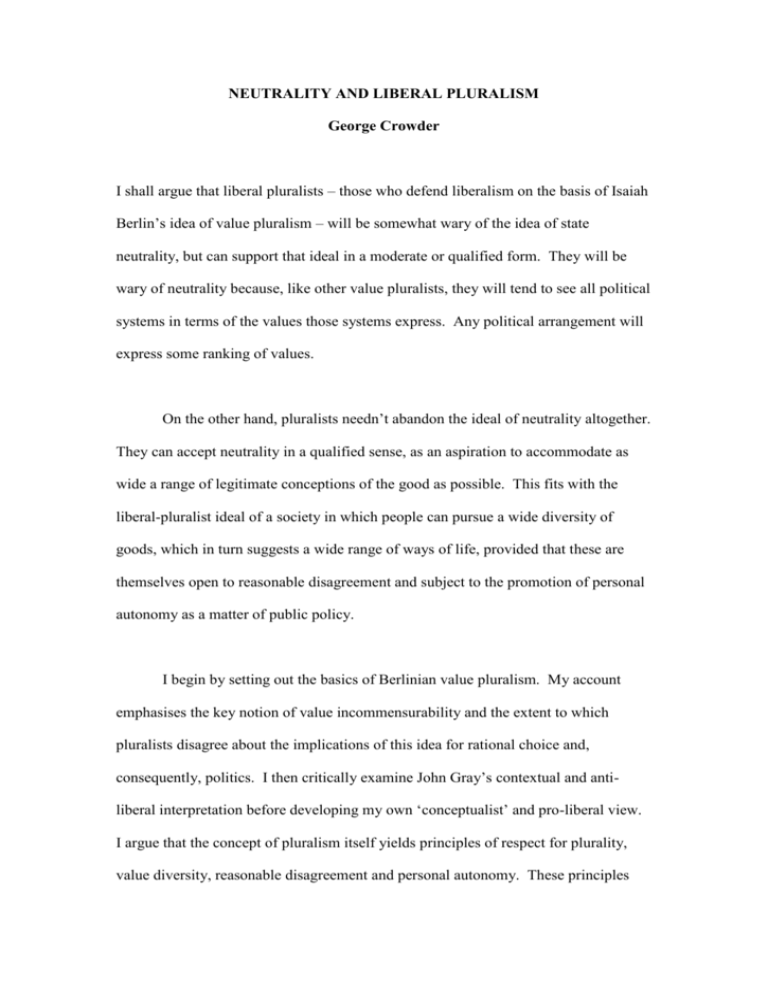
NEUTRALITY AND LIBERAL PLURALISM George Crowder I shall argue that liberal pluralists – those who defend liberalism on the basis of Isaiah Berlin’s idea of value pluralism – will be somewhat wary of the idea of state neutrality, but can support that ideal in a moderate or qualified form. They will be wary of neutrality because, like other value pluralists, they will tend to see all political systems in terms of the values those systems express. Any political arrangement will express some ranking of values. On the other hand, pluralists needn’t abandon the ideal of neutrality altogether. They can accept neutrality in a qualified sense, as an aspiration to accommodate as wide a range of legitimate conceptions of the good as possible. This fits with the liberal-pluralist ideal of a society in which people can pursue a wide diversity of goods, which in turn suggests a wide range of ways of life, provided that these are themselves open to reasonable disagreement and subject to the promotion of personal autonomy as a matter of public policy. I begin by setting out the basics of Berlinian value pluralism. My account emphasises the key notion of value incommensurability and the extent to which pluralists disagree about the implications of this idea for rational choice and, consequently, politics. I then critically examine John Gray’s contextual and antiliberal interpretation before developing my own ‘conceptualist’ and pro-liberal view. I argue that the concept of pluralism itself yields principles of respect for plurality, value diversity, reasonable disagreement and personal autonomy. These principles add up to a case for a form of liberalism in which a special concern for individual autonomy frames the accommodation of multiple goods and conceptions of the good. Value Pluralism Moral or value pluralism is the idea, classically formulated by Isaiah Berlin, that there is a plurality of radically distinct or ‘incommensurable’ values or goods.1 These often come into conflict with one another, giving rise to hard choices. For example, when liberty and equality collide it may be difficult to determine how to rank them or trade them off against each other. Pluralism in this sense is contrasted with moral monism, according to which a single value or small set of values overrides or serves as a common denominator for all others – as, for example, in utilitarianism, where all values are measured in terms of ‘utility’. For pluralists, utility (however defined) is no more fundamental or weighty or all-embracing than other important values. The concept of value pluralism can be said to have four main elements. First, at least some moral values are objective and universal. In Berlin’s account this means that there are at least some things that have in fact been valued by most human societies over long periods of human history. An alternative version is proposed by Martha Nussbaum, who argues (inspired by Aristotle) that certain goods (or ‘capabilities’) are essential to human well-being (Nussbaum 2000). In either version this first element of value pluralism immediately sets it apart from the relativist view that there are no shared human values. Second, there are several such universal and objective values – their plurality is irreducible. Third, these values often come into conflict with one another – as in the example of liberty and equality. 2 The fourth element of value pluralism is the most distinctive: the basic human values are ‘incommensurable’ with one another. Literally this means that the values are not subject to a common measure. The general idea is that they are so distinct from one another that each must be regarded as an independent consideration, making its own unique claims on us that cannot be translated into any other terms. So, ‘liberty’, for example, speaks with its own voice or has its own unique weight, and the same goes for ‘equality’. It’s important to note that pluralism is a different idea from ethical relativism. Relativism, at its strongest, holds that there are no moral universals, only value judgements made from within particular perspectives (e.g. personal or cultural), none of which is inherently superior to any other. Pluralism, by contrast, is essentially a universalist view, holding that there are at least some generic shared human values, but adding that these (and other values) are distinct and incommensurable.2 Nevertheless, it might be thought that the pluralist view leaves us with a problem of rational choice that has much the same relativising effect as relativism itself. When incommensurable values conflict with one another, we seem to be faced with hard choices. In any particular case should we favour more liberty or more equality, for example? Under pluralism, each is an independent and fundamental consideration. A choice in either direction involves a loss of something genuinely valuable – not necessarily the complete sacrifice of that value, but at least a diminution of its claims in the case at hand. 3 Is any such choice better than any other? Under pluralism we cannot answer this question simply by referring to a monist rule such as utilitarianism, for the reason given earlier: utility is at best one significant consideration among others. This would seem to be a problem for any general rule one might propose, since any such rule would tend to privilege one or a few values over others. If so, does pluralism not leave us with something like the problem of relativism: that no choice can be shown to be better than any other? The nature of choice under pluralism is vigorously debated. There are perhaps three main interpretations, and each of these corresponds to a different account of the kind of politics that best fits with a value-pluralist view. First, there is what might be called the ‘subjectivist’ view. According to this, incommensurable values are wholly incomparable with one another; consequently choices among them must be ultimately non-rational, or not guided by any reason that is decisive over others. This view implies acceptance of ‘agonistic’ forms of politics that emphasize the inevitability, even desirability, of contests for power or recognition rather than reasoned debate and consensus. This position has been attributed to William Connolly, for example (Connolly 2002, 2005). A common objection to the subjectivist-agonistic interpretation of pluralism is that it neglects ordinary moral experience. People are in fact often able to find decisive reasons for ranking or trading off conflicting incommensurables, if not in the abstract then at least in (some) particular cases. For example, it’s true that impartial justice cannot be ranked ahead of personal loyalty in absolute terms – that is, in every 4 case. But in a particular case there may be good reason to prioritize one over the other: justice will come before loyalty for the trial judge or public official, personal affiliation will come before impersonal even-handedness for the parent or child. Consequently, a second interpretation of choice under pluralism is often advanced: the ‘contextualist’ view. Decisive reasons to choose in one direction rather than another may be generated by context. ‘Context’ is of course open to a range of interpretation, but perhaps the most common understanding upheld by pluralists equates context with culture. Berlin, for example, sometimes refers to the need under pluralism to seek guidance from ‘the general pattern of life in which we believe’ (2002: 47). This approach implies a conservative, traditionalist approach to politics, in which moral and political choices are determined by reference to existing cultural traditions or settled ways of life. Such a conservative reading is found, for example, in some of the work of John Gray, and more consistently in the thought of John Kekes (Gray 1993, 1995a, b, 2000; Kekes 1993, 1997, 1998). There is also a third, ‘conceptual’, account of choice under pluralism, which appeals to principles of universal scope drawn from reflection on the concept of value pluralism itself. I believe that this interpretation of pluralist choice implies a strong case for liberalism, but I shall return to it later. I want first to retain focus on the contextualist aspect of the pluralist message in order to review the leading argument that attempts to drive a wedge between pluralism and liberalism, in particular defences of liberalism based on neutrality. This is Gray’s argument. 5 Pluralism against liberalism? Gray accepts value pluralism, but argues that its political implications are more radical, and less friendly to liberalism in particular, than Berlin, for example, supposed (Gray 1995a: 1-2). According to Gray, pluralism undermines the universalism of the liberal tradition. At best, liberalism can be accepted in an ‘agonistic’ form in which its claims are advanced only locally, or relative to some specific cultural perspective. Even then its principles are not strongly determinate but subject to conflicts that cannot be decisively resolved by reason.3 Gray’s basic argument against liberal universalism is that if pluralism is true, then no value rankings are universally valid. Thinkers within the liberal tradition, whatever particular version of liberalism they propose, in effect privilege the values that are characteristic of the liberal outlook – typically, particular conceptions of toleration, equality and personal liberty. But from a pluralist point of view these are only some basic human values among others, and together they add up to only one possible package or permutation of values among others. If basic values are incommensurable with one another, then there is no good reason to rank them in one particular order in every case, yet that is what liberals in effect propose. Gray insists that this objection applies to neutralist as well as to perfectionist justifications of liberalism. In the case of the latter, he argues, the privileging of goods such as personal liberty is more obvious. Liberals such as Locke, Kant and Mill all elevate some conception of personal liberty above other considerations, effectively resting their arguments on a specific conception of the good with the relevant sense of liberty at its centre. For Gray, this amounts to an arbitrary 6 preference for individual liberty over other goods, and also for certain kinds of liberty rather than others – for example, negative versus positive liberty in some cases. Most fundamentally, all forms of perfectionist liberalism ‘have a conception of rational choice at their heart which Berlin’s value-pluralism subverts’ (1995a: 145). That is, they suppose that there can be good reason to rank certain goods over others in all cases, a supposition that pluralists deny. In Gray’s view the same problem arises for the neutralist liberal. Contemporary liberals such as Rawls and his followers might try to escape from the pluralist objection by arguing that liberalism can be conceived as, in effect, proposing no ranking among incommensurable goods. On this view liberalism amounts to no more than a thin, procedural framework within which individuals and groups are free to pursue whatever thick, substantial goods they please – in Rawls’s terminology, the liberal ‘right is prior to the good’, or ‘neutral among competing conceptions of the good’. For Gray, however, this move is merely evasive. It masks the reality that the liberal right, however thinly defined, still embodies one particular ranking of values among others. He cites Raz, for example, as having shown that liberal notions of basic rights rest on particular conceptions of human well-being (1995b: 71-2, 136). The various proposals for a neutral liberal framework can be shown to depend, once again, on the privileging of individual liberty or choice over other goods, and on preferences for certain senses of liberty over others. The move towards ‘political liberalism’ made in Rawls’s later work doesn’t help, but only reproduces the basic problem within a narrower context (1995b: 75ff). Even within the ‘public political 7 culture’ of a ‘constitutional democracy’, there will be hard choices among conflicting incommensurables such that Rawls’s theory of ‘justice as fairness’ is at best one possibility among others. I think that Gray’s pluralist case against liberal universalism, and especially against liberal neutrality, should be conceded on certain points of detail, but also that its overall tendency should be rejected. What should be conceded is that all defences of liberalism do involve the ranking of basic values, and consequently that there is no such thing as absolute or strict neutrality in liberal (or any) political argument. Liberals do typically place special weight on certain goods, especially individual liberty in its various senses, rather than others. Indeed, as Berlin points out, ‘neutrality is also a moral attitude’ (2002: 23). The aspiration to be as even-handed or unbiased as possible in dealing with different values, beliefs and ways of life is itself a substantial ethical commitment.4 What should be denied is that this concession delivers a ‘death-blow’ (as Gray likes to put it: 1995a: 149) against liberal universalism, or even against liberal neutrality if this is formulated with appropriate moderation. What really matters in the idea of neutrality is not the formulation of principles that somehow avoid drawing on any conception of the good. That goal will never be achieved. What matters is the more general background aspiration to be as accommodating as possible to the full range of legitimate human values and conceptions of the good. Some political, social and cultural systems are patently more accommodating in this respect than others. The question is how far liberalism, and how far any particular version of liberalism, 8 answers to that general aspiration. Liberals can jettison strict neutrality but still aspire to approximate neutrality or maximal accommodation, and that’s what really matters. For the liberal pluralist, the question is also whether there is a link between the pluralist outlook and a commitment to neutrality in this more relaxed sense – that is, to maximal accommodation of basic values. In the next section I shall argue that there is indeed a strong link between pluralism and a commitment to maximal accommodation of basic values, and that this amounts to a strong link between pluralism and liberalism. Before proceeding, I want to make two general points. First, the idea of value pluralism primarily concerns the plurality and incommensurability of values or goods rather than of cultures or ways or life or conceptions of the good. This basic point is frequently lost sight of by writers like Gray, who slip into talk of the incommensurability of cultures.5 When that kind of talk is joined with Gray’s tendency to regard liberalism as culturally specific, the result is his view that liberalism is merely one political perspective among others, incommensurable with the alternatives, and therefore automatically disqualified from claiming any universally superior ranking. This view conflates pluralism with cultural relativism. Even if it were true that liberalism is culturally specific (also a dubious claim, I think), it’s not true that, on a pluralist view, cultures are incommensurable. On a pluralist view cultures cannot be incommensurable because they overlap on the basic human values that they all express, albeit in different ways. I shall return to this point shortly when I discuss the pluralist commitment to ‘diversity’. 6 9 Second, it seems to me that the standard distinction between perfectionist and neutralist forms of liberalism is not much to the point in this argument. If strict neutrality is not possible, then we are committed to a form of liberalism that is in some degree perfectionist. However, such a liberalism may still be approximately neutral or maximally accommodating, and so only weakly or moderately perfectionist. On the other hand, if pluralism is to be taken seriously, then we are committed to a form of liberalism that is maximally accommodating and therefore weakly or moderately ‘neutral’. In other words, perfectionist and neutralist accounts of liberalism converge or overlap on the goal of accommodation. This is very much the territory of liberal pluralism. Liberal pluralism Earlier I claimed that, in addition to the subjectivist and contextualist accounts of choice under pluralism, with their agonistic and conservative political implications, there is a third possibility: a conceptualist account. The basic idea is that the concept of pluralism itself yields principles that can guide ethical and political choice not just within a particular cultural context but universally. I propose four such principles. The first of these, ‘respect for plurality’, is the most fundamental, conditioning the other three. The other three all point to a case for liberalism as, universally, the best political expression of the pluralist outlook. Further, I argue that pluralism points towards a specific form of liberalism, redistributive rather than laissez-faire, and supportive of personal autonomy in a strong sense. This view differs from some of the stricter neutralist defences of 10 liberalism, but is compatible with a more relaxed, moderate and (I think) realistic approach to liberal neutrality. 1. Respect for plurality The first principle is that, if pluralism is true, we should respect or take seriously every item in the full range of genuine human values. Pluralism is the idea that there are many intrinsic goods – that is, goods valuable for their own sake. Each of these goods makes its own unique claims on us, requiring our respect. I have in mind here something like the goods implied by Martha Nussbaum’s list of ‘central human capabilities’ (2000: 70-86). To take pluralism seriously is to take seriously every one of these goods, and to do so equally. Of course, ‘equal’ respect here cannot mean that we can measure these goods against each other, since pluralism denies that there can be such a common measure among basic goods. However, the idea of equal respect for basic values does not require the possibility of measurement any more than measurement is required for equal respect for persons. The imperative is to treat each good as fundamentally no less significant than any other. What this rules out is the possibility of our blinding ourselves to values that ought to weigh in our considerations but which we may be tempted to ignore or downplay. There are many instances in the history of moral and political thought of thinkers who have fallen into that trap. These are the monists: thinkers who have emphasised certain values or goals to such an extent that these are held to override all other values in every situation. Examples include Plato’s stress on specialisation and 11 philosophical knowledge in the Republic, Rousseau’s conception of positive liberty as the pre-eminent human good, and Marx’s vision of the proletarian revolution as the goal of human history. What respect for plurality does not rule out is the obvious need for choice where fundamental values conflict within one another. To respect a particular good is not necessarily to promote it or to choose it for oneself in every case, since to do so may prevent us from promoting or choosing some other important good. At the social level there is sometimes not enough ‘social space’ in which to pursue in practice all the goods we may wish to honour in principle (Rawls 1993, 57 note). This may be because of lack of time or resources, or it may be that certain goods conflict with one another as a matter of necessity – as when someone cannot simultaneously enjoy the benefits of single life and married life. Pluralists acknowledge that choices must sometimes be made that are hard in the sense that they involve the sacrifice or diminution of something genuinely valuable. Such choices may even be ‘tragic’ where the values at stake are especially important. However, one can respect a value even when one chooses against it. In part, this will be a matter of attitude: one chooses against a degree of liberty, for example, in order to gain a greater degree of equality, but one does so with regret rather than indifference or recklessness (Nussbaum 1990: 63-66). This may seem a rather precious requirement, but the point is not just to commend impotent hand-wringing. The attitude we display in one case may have consequences in the next: if we elevate certain considerations and ignore others often enough, our preoccupation on one side and indifference on the other can become a settled disposition. 12 More important still, to respect a good we choose against is to make that choice for a reason. In the absence of practical reasoning our choices would be arbitrary and incoherent, resulting in lives in which goods are pursued or neglected at random, without attention to their real value (Kekes 1993, 97-8). Pluralism does not imply indifference; on the contrary, it stresses the intrinsic value of many goods. Practical reasoning is essential to the honouring of these goods. To sum up: If pluralism is true then we have a duty to respect or take seriously each item in the full range of human goods, and to do so equally. To respect value plurality in this sense is not to promote or choose every good in every case, since that is impossible. It does mean that when we have to choose against a good in a particular case, we should do so with regret rather than indifference, and for a reason. 2. Value diversity Given the principle of respect for plurality, pluralism commits us, prima facie, to the promotion of more goods rather than fewer in a given society – that is, pluralism generates a principle of ‘value diversity’. If we ought to respect the full range of genuine human values, then we ought to promote those values so far as we are able. Roughly speaking, it is generally better that a society embrace a greater rather than narrower range of values (Williams 1978: xviii). When it comes to determining the best political vehicle for advancing this diversity of goods, liberalism has a strong claim. Its traditional emphasis on individual liberty, toleration and personal autonomy clears social spaces within which individuals and groups can pursue a wide range of different purposes. 13 This argument contains two main steps: from pluralism to diversity, and from diversity to liberalism. In each case the basic claim is subject to significant qualifications. In the move from pluralism to diversity, the first of these qualifications has already been outlined. Pluralist diversity obviously cannot require the promotion of every genuine good in every case, since goods sometimes conflict and choices or trade-offs have to be made. Nevertheless, the diversity principle suggests something like a presumption in favour of promoting more goods rather than fewer, indeed a presumption in favour of promoting the full range of human values until we are obliged to be more selective. Of course, in any particular practical situation we shall have to be selective. At that point pluralism, as argued earlier, requires us to choose in the right spirit and for a reason. But the prior point still holds: that until we have a reason to choose, pluralism bids us promote the full range of human values. In effect, pluralism raises a rebuttable presumption in favour of greater rather than lesser value diversity. Second, however, when we try to pursue the pluralist goal of diversity, this cannot be a simple matter of promoting ‘more’ rather than ‘fewer’ goods, or maximising a quantity of goods. For one thing, pluralists cannot accept that there is any common measure according to which different goods can be quantified. Further, since goods conflict, they cannot simply be aggregated. Rather, we have to pay attention to the degree of coherence among the goods we promote. Instead of merely 14 adding one good onto the last, we need to think in terms of alternative packages of goods, each displaying a tolerable degree of internal coherence. The goal of value diversity, then, should be understood in terms of a tolerably coherent package of values that can be judged to express a greater range of human goods, overall, than the alternatives. This comparison will clearly not be precisely measurable, but rather a matter of judgement. Judgement need not invoke measurement, and moral and political judgements are, by and large, cases in point. Quantification is not required, for example, for the judgement that a more diverse package of goods was promoted by liberal Western societies of the twentieth century than by the Soviet Union. Admittedly, this kind of judgement will be very rough and ready. It won’t, by itself, enable us to produce a neat ranking among contemporary liberal democracies, for example, let alone among specific policies. But it does generate a significant point of principle, and one that will be supplemented by other pluralist considerations I shall come to shortly. Supposing that there is a link between pluralism and diversity as described, what about the claimed connection between diversity and liberalism, especially liberal neutrality? Here Gray objects that although pluralism implies an ethic of diversity, diversity is not best served by liberalism (1995a: 152). The reason is that Gray understands the diversity in question as a diversity of cultures or forms of life. Because different forms of life generate different political systems, pluralist diversity therefore endorses a diversity of political regimes. Liberalism will be one of these, but 15 only one among others – it will possess no privileged status. The optimal pluralist world will contain both liberal and non-liberal regimes. The problem with this view should be evident already: it blurs the boundary between pluralism and cultural relativism. On a distinctively pluralist view it is particular goods, such as liberty and equality, that are incommensurable, not whole cultures. Whole cultures cannot be incommensurable because pluralists accept that at least some values are shared universally. Consequently, the ideal of diversity implicit in pluralism refers, primarily, not to political regimes or forms of life, as assumed by Gray, but to goods or values. Rather than valuing and promoting a diversity of regimes or cultures without regard to their content, value pluralists should value and promote a diversity of regimes and cultures that are themselves internally diverse – that is, that exhibit internally a diversity of goods and (secondarily) ways of life. Once more, liberalism has a strong claim to being acknowledged as the political form most accommodating of this kind of diversity. This is not to say that liberalism is limitlessly accommodating or wholly neutral among conceptions of the good life, merely that a liberal order leaves more room for a variety of goods and conceptions of the good to be pursued than does any known alternative. Finally, the diversity argument favours certain forms of liberalism over others. In particular, value diversity is a criterion that is more convincingly satisfied by ‘social’ or ‘egalitarian’ types of liberalism, which balance individual liberty with equality and social justice, than by ‘classical’ or ‘laissez-faire’ or ‘neo-liberal’ forms, 16 which elevate negative liberty (i.e. liberty as non-interference) and the free market above all other considerations. This view is supported by Berlin’s attack on laissezfaire capitalism. The problem with laissez-faire, according to Berlin, is that it maximises the amount of negative liberty in a society, but at the cost of ignoring other important values, such as social justice, equality, and compassion (2002: 37–9).7 2. Reasonable disagreement A second universal principle implicit in value pluralism has close affinities with an idea made familiar by the leading defenders of ‘political liberalism’, John Rawls (1993) and Charles Larmore (1996). For these thinkers a salient feature of the modern world is ‘the fact of pluralism’: there is widespread disagreement about how people ought to live their lives. Further, much of that disagreement is ‘reasonable’: even if some views of the good life are mistaken, there is no way this kind of mistake can be rationally demonstrated, and those who adhere to these views must be regarded as doing so on reasonable grounds. Where disagreements are reasonable in this sense they are likely to be permanent. A realistic and prudent form of politics will therefore accept and accommodate reasonable disagreement rather than trying to overcome it. Liberalism, with its characteristic acceptance of plural conceptions of the good, is such a realistic and prudent political form. Much the same case can be made in distinctively value-pluralist terms. 8 Conceptions of the good life can be thought of as essentially schemes for ranking basic human goods in most cases. Christians, for example, emphasise humility and love for one’s neighbour as especially important values for all human beings in all or most circumstances; imperial Rome celebrated manly strength and self-assertion in 17 the same general terms (Berlin 1990: 8). If at least some basic values are incommensurable, then many such general rankings will be prima facie reasonable. This is not to say that pluralism endorses all conceptions of the good without exception, since some do better than others when judged by pluralist standards such as value diversity, for example. But within those limits there will be much legitimate variation. Consequently, many disagreements concerning the merits of rival conceptions of the good will also be reasonable. That reasonable disagreement ought to be accommodated, and liberalism provides the appropriate political vehicle for such accommodation. It might be objected that there is a hidden assumption here. Even if disagreements about the good life are ‘reasonable’ in the sense that many substantial claims in this area are not demonstrable, how does it follow that such claims should be accommodated rather than overruled by an orthodoxy asserted by force? To put this another way, the reasonableness of this kind of disagreement makes it permanent unless it is ended by force – for example, the enforcement of a particular religion. From a pluralist point of view, why should enforcement of orthodoxy be trumped by liberal accommodation? Does liberal accommodation award an un-pluralist priority to toleration or respect over unity or righteousness? One response to this challenge would be to appeal to the traditional Lockean point that, since beliefs in such matters are private to the believer, attempts to use the blunt instrument of the state to enforce belief are likely to be futile (Locke 1689). Second, Berlin makes the point that ‘drastic action’ tends to lead to consequences that 18 are predictable only in that they always involve ‘the avoidable suffering of the innocent’ (1990: 17). This second reply can be supplemented by a more distinctively pluralist consideration, based on the principle of ‘respect for plurality’. Coercion always has costs, and the massive degree of coercion that would be required (at least under modern conditions) to enforce allegiance to a single ‘thick’ conception of the good would have massive costs. From the pluralist point of view, which requires respect for the full range of human goods, such costs are highly unlikely to be acceptable. History, it is true, is full of instances where people have believed that no cost was too great in order to realise some supreme end. But that kind of view has tended to rest on the monism that pluralists oppose. Note that the pluralist endorsement of reasonable disagreement means that conflicts among incommensurable goods cannot be resolved simply by appealing to local traditions. On the pluralist view, traditions themselves embody rankings of incommensurables that are subject to reasonable disagreement. Moreover, for the pluralist this is not just a fact about the modern world but a feature of the human condition: traditions have always embodied particular value-rankings that may be disputed. Of course, one could say the same thing about liberal traditions or conceptions of the good. But liberals are typically prepared to see their own deepest convictions questioned, and even regard this as essential – as in Mill’s arguments for freedom of expression. More importantly, the peculiarity of liberal conceptions of the human 19 good is that they tend to be more ‘open-textured’ than traditionalist or conservative conceptions. They leave room for people to pursue different ends and projects, including many of those valued by traditionalists. Traditionalists, on the other hand, tend not to repay the liberal compliment. 3. Individual autonomy The pluralist argument from reasonable disagreement shows that we cannot resolve conflicts among incommensurables simply by appealing to tradition. Similarly, we cannot rely on monist rules like utilitarianism to resolve our difficulties – these, too, represent rankings of incommensurables that reasonable people may contest. How, then, can we decide such questions? To choose well under pluralism is to think for ourselves, to be autonomous, in a strong sense. We must be prepared to deal with each choice on its own terms, weighing all relevant competing considerations, including those that conflict with rules and customs. We must be able to stand back from received rules and customs, recognise the value rankings these embody, and critically assess their application in the circumstances. This may involve appeal to background values such as personal and collective conceptions of the good, but these too must be subject to revision. That is, pluralism obliges us to be strongly autonomous if we want to make a good job of deciding fundamental conflicts of value. And since individual autonomy is one of the most distinctive ideals of liberalism, it is in a liberal political order that the capacity for individual autonomy is most likely to be nurtured. 20 In short, to cope well with the hard choices that pluralism imposes on us is to be able to choose autonomously, or critically. But why not say that from a pluralist point of view rational choice is itself merely one value among others, no more inherently worthy than arbitrary plumping? The answer appeals once again to the principle of respect for plurality. Under pluralism we should honour all genuine goods so far as circumstances allow. To determine how far circumstances allow the pursuit of a particular good or combination of goods is the province of practical reasoning. Practical reasoning is essential to the honouring of these goods. Since practical reasoning under pluralism requires personal autonomy, respect for plurality requires autonomous thinking.9 This pluralist case for individual autonomy has significant ethical and political implications. The ethical message is that the capacity for autonomy is a characteristic of the best lives from a pluralist point of view. People who are not equipped to think critically will be to that extent ill-equipped to cope well with the hard choices that, on the pluralist view, will inevitably confront them. This does not mean that heteronomous lives are valueless. Such lives may well exhibit many genuine goods. But heteronomous lives lack a capacity for good decision making in the face of inevitable and profound value conflict.10 Since that capacity is so vital to the central principle of respect for plurality, it is unlikely that a heteronomous life, whatever other goods it may exhibit, will be as satisfactory overall as an autonomous life.11 This ethical emphasis on the value of personal autonomy has political implications, and these are controversial. William Galston (2002) has argued that pluralism implies a ‘Reformation’ form of liberalism that rejects personal autonomy 21 as a goal of public policy because it’s too controversial among traditional religious and cultural groups. Instead, Reformation liberalism emphasizes the moral authority (within limits) of cultures and an ideal of group-based toleration. But Galston’s interpretation, like Gray’s, only more subtly, blurs the boundary between value pluralism and cultural pluralism. Essentially it forgets that value pluralism is primarily about the plurality of values, not cultures. In my view, pluralism implies a case for what Galston calls an ‘Enlightenment’ liberalism. This stresses the ethical weight of plural human goods over the authority of cultures, and emphasizes personal autonomy as an especially important (although not always overriding) value.12 Someone might object that my conclusion is un-pluralist because I have in effect accorded a universal privilege to a single good, namely individual autonomy. But my argument does not require that autonomy be privileged in every case. I do not deny the possibility of situations where personal autonomy appropriately yields to rival considerations such as urgency or security or the demands of personal relationships. The principles I have advanced need not be conceived as absolutes. Galston captures the appropriate liberal-pluralist view here when he refers to the possibility under pluralism of strong but rebuttable presumptions – in favour, for example, of human rights (2002: 69-78). The same point may be made in favour of the principles for which I have argued. The point is that, from a pluralist perspective, moral decisions are unavoidably made within a political framework that is shaped by some general ranking of values. 22 The question is whether, and to what extent, this ranking answers to fundamental concerns implicit in the concept of pluralism itself – namely, the criteria of value diversity, reasonable disagreement and personal autonomy. Together, these values amount to a case for an identifiably liberal political order, and for a liberal order in which ensuring that people have a capacity for individual autonomy is a public ideal. Conclusion I hope to have shown that Berlinian value pluralism is resistant to strict neutrality but supportive of a more relaxed understanding of neutrality as the maximal accommodation of multiple goods and, secondarily, ways of life or conceptions of the good. Indeed, not only is that kind of accommodation compatible with pluralism, it can be grounded in pluralism – through the intermediate principles of respect for plurality, value diversity, reasonable disagreement, and personal autonomy. Notes For Berlin’s account of pluralism see ‘Two Concepts of Liberty’ in Berlin 2002, ‘The Pursuit of the Ideal’ in Berlin 1990, and ‘My Intellectual Path’ in Berlin 2000a. Other leading treatments of pluralism include Raz 1986, Stocker 1990, Kekes 1993, Richardson 1997, Chang 1999, Galston 2002. 1 For the contrast between pluralism and relativism see Berlin, ‘Alleged Relativism in Eighteenth-Century European Thought’, in Berlin 1990; Crowder 2004: 114-123; Lukes 2003, ch. 7. 2 3 Later Gray developed a view according to which conflicts among rival conceptions of the good under pluralism can be handled satisfactorily only by pragmatic ‘modus vivendi’ settlements: Gray 2000. Again, liberalism has only a qualified role, since a modus vivendi settlement need not privilege or emphasize liberal goods in preference to others. 4 This point is, of course, familiar from contemporary communitarian thought. On the relation between pluralism and communitarianism see Crowder 2006. 5 Berlin is also sometimes at fault in this respect: see Berlin 2000b: 233, 235. 23 6 Even if whole cultures were incommensurable, that would not necessarily rule out the possibility of ranking them, on the model of the reasoned ranking of incommensurable values, either in context or according to the principles implicit in pluralism itself. Consequently, even if Gray were right about the incommensurability of cultures, that would not be enough to eliminate arguments for the superiority of liberal cultures. For a similar argument, directed against Robert Nozick’s theory of the minimal State, see Hart 1979. A liberal-pluralist case for redistribution is developed in Crowder 2002: 226-36, and 2004: 176-82. 7 But note that the relation between Berlinian liberal pluralism and Rawlsian ‘political liberalism’ is not without friction: see the criticism of liberal pluralism in Larmore 1996 chapter 7. Liberal pluralist responses to this critique include Crowder 2002, chapter 7, and Galston 2002, chapter 4. 8 9 Martha Nussbaum presents a similar picture of practical reason as necessary (along with ‘affinity’) to ‘organise’ other goods: 2000, 82. She does now distinguish practical reason from liberal autonomy, but I believe that distinction is questionable. 10 My argument is that under pluralism lives can count as good to the extent that they exhibit a capacity for personal autonomy rather than its actual, or continual, exercise. This leaves open the possibility that people may choose autonomously to live in traditional, non-autonomous ways. For the distinction between capacity and exercise in relation to personal autonomy, see Brighouse 2000, chapters 4–5; Reich 2002. 11 Unlikely but not impossible: an autonomous life may be so disastrous in other respects that it cannot be said to be as good overall as a heteronomous life which contains many significant goods. Nevertheless, a non-disastrous autonomous life is likely to go better overall than a non-disastrous heteronomous life, since the former contains greater opportunity for revision in line with what really matters to the person living it: see Kymlicka 1995: 80-81. 12 My case for Enlightenment versus Reformation liberalism is more fully set out in Crowder 2007. References Berlin, I. 1990. The Crooked Timber of Humanity: Chapters in the History of Ideas, ed. H. Hardy. London: John Murray. Berlin, I. 2000a. The Power of Ideas, ed. H. Hardy. London: Chatto & Windus. Berlin, I. 2000b. Three Critics of the Enlightenment: Vico, Hamann, Herder, ed. H. Hardy. London: Pimlico. Berlin, I. 2002. Liberty, ed. H. Hardy. Oxford: Oxford University Press. Brighouse, H. 2000. School Choice and Social Justice. New York: Oxford University Press. Chang, R. 1997. ‘Introduction’, in Incommensurability, Incomparability, and Practical Reason, ed. R. Chang. Cambridge, Mass., Harvard University Press. 24 Connolly, W. 2002. Identity/Difference: Democratic Negotiations of Political Paradox. Minneapolis/London: University of Minnesota Press. Connolly, W. 2005. Pluralism. Durham, NC and London: Duke University Press. Crowder, G. 2002. Liberalism and Value Pluralism. London and New York: Continuum. Crowder, G. 2004. Isaiah Berlin: Liberty and Pluralism. Oxford: Polity. Crowder, G. 2006. ‘Value Pluralism and Communitarianism’, Contemporary Political Theory 5: 405-427. Crowder, G. 2007. ‘Two Concepts of Liberal Pluralism’, Political Theory 35: 121-46. Galston, W. 2002. Liberal Pluralism: the Implications of Value Pluralism for Political Theory and Practice. Cambridge: Cambridge University Press. Gray, J. 1993. Post-Liberalism: Studies in Political Thought. New York and London: Routledge. Gray, J. 1995a. Berlin. London: HarperCollins. Gray, J. 1995b. Enlightenment’s Wake: Politics and Culture at the Close of the Modern Age. London and New York: Routledge. Gray, J. 2000. Two Faces of Liberalism. Cambridge: Polity. Hart, H. L. A. 1979. ‘Between Utility and Rights’, A. Ryan, ed., The Idea of Freedom: Essays in Honour of Isaiah Berlin. Oxford: Oxford University Press. Kekes, J. 1993. The Morality of Pluralism. Princeton: Princeton University Press. Kekes, J. 1997. Against Liberalism. Ithaca: Cornell University Press. Kekes, J. 1998. A Case for Conservatism. Ithaca: Cornell University Press. Kymlicka, W. 1995. Multicultural Citizenship. Oxford: Clarendon Press. Larmore, C. 1996. The Morals of Modernity. Cambridge: Cambridge University Press. Lukes, S. 2003. Liberals and Cannibals: The Implications of Diversity. London and New York: Verso. Nussbaum, M. 1990. Love’s Knowledge: Essays on Philosophy and Literature. Oxford: Oxford University Press. Nussbaum, M. 2000. Women and Human Development: the Capabilities Approach. Cambridge: Cambridge University Press. Rawls, J. 1993. Political Liberalism. New York: Columbia University Press. Raz, J. 1986. The Morality of Freedom. Oxford: Clarendon Press. Reich, R. 2002. Bridging Liberalism and Multiculturalism in American Education. Chicago: University of Chicago. Richardson, H. S. 1997. Practical Reasoning about Final Ends. Cambridge: Cambridge University Press. Stocker, M. 1990. Plural and Conflicting Values. Oxford: Clarendon Press. Williams, B. 1978. ‘Introduction’ to I. Berlin, Concepts and Categories: Philosophical Essays. London: Hogarth. 25
